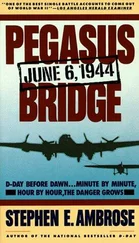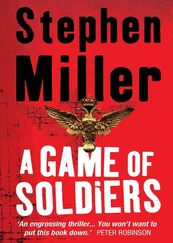Stephen Ambrose - Citizen Soldiers [Condensed]
Здесь есть возможность читать онлайн «Stephen Ambrose - Citizen Soldiers [Condensed]» весь текст электронной книги совершенно бесплатно (целиком полную версию без сокращений). В некоторых случаях можно слушать аудио, скачать через торрент в формате fb2 и присутствует краткое содержание. Жанр: История, на английском языке. Описание произведения, (предисловие) а так же отзывы посетителей доступны на портале библиотеки ЛибКат.
- Название:Citizen Soldiers [Condensed]
- Автор:
- Жанр:
- Год:неизвестен
- ISBN:нет данных
- Рейтинг книги:5 / 5. Голосов: 1
-
Избранное:Добавить в избранное
- Отзывы:
-
Ваша оценка:
- 100
- 1
- 2
- 3
- 4
- 5
Citizen Soldiers [Condensed]: краткое содержание, описание и аннотация
Предлагаем к чтению аннотацию, описание, краткое содержание или предисловие (зависит от того, что написал сам автор книги «Citizen Soldiers [Condensed]»). Если вы не нашли необходимую информацию о книге — напишите в комментариях, мы постараемся отыскать её.
Citizen Soldiers [Condensed] — читать онлайн бесплатно полную книгу (весь текст) целиком
Ниже представлен текст книги, разбитый по страницам. Система сохранения места последней прочитанной страницы, позволяет с удобством читать онлайн бесплатно книгу «Citizen Soldiers [Condensed]», без необходимости каждый раз заново искать на чём Вы остановились. Поставьте закладку, и сможете в любой момент перейти на страницу, на которой закончили чтение.
Интервал:
Закладка:
History was very much on his mind. In the evenings he was reading Caesar's Gallic Wars. He was especially interested in Trier, at the apex of the Saar Moselle triangle, on his northern flank. The historic city of the Treveri, according to Caesar, had contained the best cavalry in Gaul. Patton wanted Trier. He inveigled the 10th Armoured out of Bradley and sent it to take the city.
Lieutenant Colonel Jack Richardson (LJSMA, 1935) of 10th Armoured led a task force in the successful attack into Trier. Driving into the city along Caesar's road, Patton "could smell the sweat of the Legions," imagining them marching before him into the still surviving amphitheatre where the emperor Constantine the Great had thrown his captives to the beasts. He could not rest. Third Army had started the February campaign further from the Rhine than any other army on the Western Front. He still had so far to go that he feared his would be the last army to cross. "We are in a horse race with Courtney [Hodges]," Patton wrote his wife. "If he beats me [across the Rhine], I shall be ashamed."
BY THE MIDDLE of the first week in March, Ninth and First armies were closing to the Rhine, threatening to encircle entire divisions. Hitler ordered counterattacks. As a consequence, thousands of German troops were trapped on the west bank, where they either surrendered or were killed. First Army intelligence declared: "Perhaps it is too early to be optimistic but everyone feels that resistance is on the point of crumbling."
Cologne was a magnet for First Army. The famous cathedral city was the biggest on the Rhine. The Germans had never imagined invaders from the west would get that far, so Cologne was defended only by a weak outer ring of defences, manned by bits and pieces of a hodgepodge of divisions, and a weaker inner ring, manned by police, firemen, and Volkssturm troops. Such forces could not long hold up an American army at the peak of its power.
Americans were pouring through the Siegfried Line. The columns were advancing fifteen kilometres a day and more. Meanwhile, the artillery was pounding the cities and bridges. Major Max Lale wrote his wife on March 2: "Tonight, just at dusk, I stood from a long distance away and watched the plumes of smoke, the flashes of flames, and listened to the long, low rumble that marked the death of one of the oldest cities in Europe."
On March 5 General Maurice Rose's 3rd Armoured Division entered Cologne, followed by General Terry Alien's 104th Division. The next day Rose's tanks reached the Hohenzollern Bridge, but most of the structure was resting in the water, as were the other Cologne bridges over the Rhine. In Cologne only the great cathedral stood, damaged but majestic. Like St Paul's in London, it had been used as an aiming point but was never knocked down.
It was carnival time. Mardis Gras came on March 7. In Cologne, one of the most Catholic of German cities, the inhabitants did their best to celebrate. Lieutenant Gunter Materne, a German artillery officer, recalled that his men investigated a ship tied to a wharf, and found it filled with Champagne and still wines. They proceeded to have a party. People emerged from cellars to join in. "And so we had a great time," Materne said. "We got drunk. People came up to me and said. Take off your uniform. I'll give you some civilian clothes. The war is already lost.'" But Materne spurned the temptation and the next day managed to get across the Rhine in a rowboat.
He was one of the last Germans to escape. The Americans had taken 250,000 prisoners and killed or wounded almost as many. More than twenty divisions had been effectively destroyed. The Allied air forces were taking full advantage of lengthening days and better weather, blasting every German who moved during daylight hours, flying as many as 11,000 sorties in one day.
On the first day of World War II, then Colonel Eisenhower had written to his brother Milton: "Hitler should beware the fury of an aroused democracy." Now that fury was making itself manifest on the west bank of the Rhine. The Allies had brought the war home to Germany.
Chapter Eleven
Crossing the Rhine: March 7-31, 1945
THE RHINE was by far the most formidable of the rivers the GIs had to cross. It rises in the Alps and flows generally north to Arnhem, where it makes a sharp turn to the west. It is between 200 and 500 metres wide, swift and turbulent, with great whirlpools and eddies. The Germans on the far bank were disorganized and demoralized but still determined and capable of utilizing the natural advantages the Rhine gave them to defend their country. There were only two or three places from Cologne south that were possible crossing sites. Worse, along that stretch there were no major objectives on the east bank inland for some 50 kilometres, and the hinterland was heavily wooded, undulating, and broken by narrow valleys.
North of Cologne, Montgomery's Twenty-first Army Group had many suitable crossing sites, good terrain for a mobile offensive, and major objectives just across the Rhine in the Ruhr Valley. Beyond the Ruhr, the plain led straight to Berlin. So while Elsenhower's heart was with Bradley, Hodges, and Patton, his mind was with Monty. SHAEF G-3 had decided that north was the place for the main crossing. Eisenhower agreed, but warned that "the possibility of failure cannot be overlooked. I am, therefore, making logistic preparations which will enable me to switch my main effort from the north to the south should this be forced upon me."
As MONTGOMERY'S armies were closing to the river, he began to build his supply base for the assault crossing. Altogether he required 250,000 tons of supplies for the British and Canadian forces and the US Ninth Army and 17th Airborne Division. Ninth Army had been part of Twenty-first Army Group since the preceding fall; the 17th Airborne Division had arrived in Europe in December.
Montgomery's planning for the Rhine crossing was almost as elaborate as for Overlord. Eighty thousand men, slightly less than half the number of men who went into France on June 6, 1944, would cross the Rhine by boat or transport aeroplane on the first day for Operations Plunder (the crossing by boat) and Varsity (the airborne phase), with an immediate follow-up force of 250,000 and an ultimate force of 1 million.
Montgomery set D-day for March 24. For the two weeks preceding the assault he laid down a massive smoke screen that concealed the buildup- and gave the Germans ample warning about where he was going to cross. The air forces pounded the Germans on the east bank with 50,000 tons of bombs. Monty invited Churchill and other dignitaries to join him to watch the big show.
Beginning February 28, Ninth Army had been pushing east. Company K, 333rd Regiment, received orders to take the village of Hardt, between the Rur and the Rhine. After an all-day march through mud and cold, followed by a few hours' rest, the company formed up an hour before dawn. Everyone was groggy, exhausted and wary, since they knew their flank was open, yet they were pressing on deeper into the German lines.
The company moved out to Hardt, attacked, and got stopped by machine-gun fire and a shower of 88s. Two men were killed. The others hit the ground. Sergeant George Pope's squad got caught in the open. "We were all pinned down," he remembered. "It was flat as a floor. There wasn't a blade of grass you could hide under. I'm yelling 'Shoot, you sons of bitches!' That was a tough time."
Lieutenant Bill Masters was in the edge of a wood with half of his platoon. The remainder of his men and other platoons were getting pounded out in the open flat field. Masters recalled: "I decided I had to get these guys moving or a lot more were going to get killed." He ran forward, swearing at the men to get them going as he passed them. "I got up as far as a sugar-beet mound that gave some cover, close enough to toss a grenade at the German machine gunner right in front of me. But I couldn't get the grenade out of my pocket-it was stuck." A German tossed a potato masher. "It landed right next to me but didn't explode."
Читать дальшеИнтервал:
Закладка:
Похожие книги на «Citizen Soldiers [Condensed]»
Представляем Вашему вниманию похожие книги на «Citizen Soldiers [Condensed]» списком для выбора. Мы отобрали схожую по названию и смыслу литературу в надежде предоставить читателям больше вариантов отыскать новые, интересные, ещё непрочитанные произведения.
Обсуждение, отзывы о книге «Citizen Soldiers [Condensed]» и просто собственные мнения читателей. Оставьте ваши комментарии, напишите, что Вы думаете о произведении, его смысле или главных героях. Укажите что конкретно понравилось, а что нет, и почему Вы так считаете.
![Stephen Ambrose Citizen Soldiers [Condensed] обложка книги](/books/346737/stephen-ambrose-citizen-soldiers-condensed-cover.webp)








